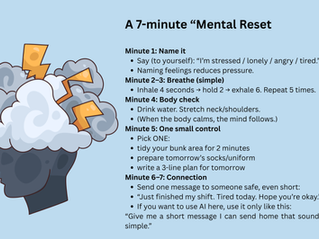The Power of Perspective: How Seafarers Can Use Mindset Shifts to Combat Stress
- IMEQ CENTER

- Jun 19, 2023
- 3 min read
Updated: Sep 12, 2023
As seafarers, you are often faced with long periods of isolation, uncertainty, and stressful situations. These challenges can take a toll on your mental health and make it difficult to maintain a positive outlook. However, by shifting your mindset, you can learn to navigate these challenges and uplift your mood even in the most difficult circumstances.
Mindfulness
One powerful way to shift your mindset is to practice mindfulness. Mindfulness involves being present in the moment, observing your thoughts and emotions without judgment. This way, you can learn to be more aware of your thoughts and emotions and develop a greater sense of control over them. This can help to reduce feelings of anxiety, stress, and depression, and improve overall mental well-being. As a seafarer, you can practice mindfulness through meditation, deep breathing exercises, or simply taking a few moments to observe your surroundings and tune in to your senses. This will help you develop a greater sense of self-awareness and improve your ability to handle stressful situations.
Gratitude
Another way to shift your mindset is to cultivate a sense of gratitude. When we focus on the things we are grateful for, we shift our attention away from negative thoughts and emotions and instead focus on the positive aspects of our lives. This can help to improve our mood, reduce stress and anxiety, and increase overall happiness. Cultivate gratitude by taking time to reflect on the things you are grateful for, such as a safe journey, good weather conditions, or a supportive crew. You can also keep a gratitude journal, where you write down things you are grateful for each day. By focusing on the positive aspects of your life, you can improve your mental state and reduce feelings of isolation and homesickness.
Self-Compassion
Moreover, you can also try to shift your mindset by practicing self-compassion. Self-compassion involves treating yourself with the same kindness, concern, and understanding that you would offer to a good friend. When we practice self-compassion, we can reduce feelings of self-criticism, shame, and guilt and improve our overall well-being. As a seafarer, you can practice self-compassion by being kind and understanding toward yourself, even in difficult situations. You can also give yourself permission to take breaks and engage in activities that bring you joy and relaxation. By practicing self-compassion, you can improve your mental health and well-being and develop a greater sense of resilience and self-confidence.
A few wellbeing tips that you can practice each day to stay positive:
Drink enough water to stay hydrated.
Communicate with the crew.
Engage in social gathering onboard.
Keep in contact with your family ashore.
Step by Step Mindfulness Breathing Exercise
Find a quiet and comfortable place: Sit or lie down in a position that allows you to relax without any distractions. Begin by bringing your attention to the present moment.
Shift your focus to your breath. Relax your shoulders and focus on your breath. Pay attention to your natural way of breathing without trying to change it.
Deep inhalation: Take a slow, deep breath in through your nose, counting to four. Feel the air fillings your lunges and expanding your belly.
Slow exhalation: Exhale slowly through your mouth, counting to six. Feel the release of tension and let go of any stress or negative thoughts with each breath out.
Repeat the cycle: Continue to inhale deeply through your nose, counting to four, and exhale slowly through your mouth, counting to six. Focus your attention on the breath.
Stay present: If your mind starts to wander, gently bring your attention back to your breath.
Gradual transition: After several minutes, gradually bring your awareness back to your surroundings. Take a moment to notice how you feel mentally and physically.
It is essential to prioritize your mental health and well-being. By shifting your mindset and practicing mindfulness, gratitude, and self-compassion, you can learn to navigate the challenges of your job and uplift your mood even in the most stressful circumstances. Remember to take time for yourself, connect with your fellow seafarers, and seek support when needed. By taking care of your mental health, you can enjoy a more fulfilling and satisfying life both on and off the sea.





































































































G(ggg